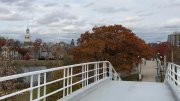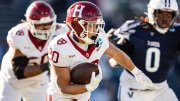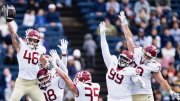Last summer, my college friends got lost around the world. One roamed the shadowy tunnels of Mayan ruins in Copan, while another hopped from train to bus to cab in a bewildered search for a route between Tokyo's Narita Airport and Yokosuka Naval Base.
I, too, got lost, but less than a half mile away from Harvard. I felt as disoriented as all my friends overseas, but by poking around in my own backyard, I found my eyes blinking into focus in more startling and important ways than I might have found traversing the globe.
As a reporter for the Bay State Banner, Boston's weekly African-American newspaper, I wandered through the Cambridgeport community one muggy June evening in search of Hoyt Field, a popular youth hangout in one of Cambridge's few remaining black neighborhoods. I am white, and despite the park's proximity to the gated pretension of Eliot House, where I live, I hadn't even known that Hoyt Field existed. But I was plenty familiar with the idea of the park. In my first weeks at Harvard, I had been warned by upperclassmen to avoid the back streets around Central Square. In the peculiar way that the conflation of race, class, and crime somehow makes "sense" to those without inner-city street experience, I took the advice to heart.
Now, three summers later, I was searching for Hoyt Field so I could report on a community meeting about the park's reputation among school officials as a recruiting hot spot for the Hillside Crips gang, a reputation community parents vociferously denied. On my way, I passed flyers proclaiming racial profiling in cambridge! plastered throughout the neighborhood to raise public concern about the school department's constitutionally iffy questioning and searching of 28 fifth- through eighth-grade students suspected of involvement in, or knowledge of, gang activity.
My map uncrumpled, heavy camera swinging around my neck, I must have looked lost to the passersby. Sporting long pants (standard uniform for a Banner reporter) in the middle of summer, I darted in and out of Central Square's tangled streets looking first for the park, and eventually for an entrance to the adjacent community center.
Twenty-five minutes late, I slipped in the side door of the humid center to be greeted by a few smiles from some of my reporting sources--after weeks of interviews, now friends--already sitting in the packed audience of mostly African-American parents. Perhaps the only one sweating more than I was Cambridge's school superintendent, Bobbie D'Alessandro, who faced parents outraged at what they called racially motivated attacks on the psychological health of students.
It didn't hit me until later, during my seven-minute walk home, that only three years ago I had imagined an incredible distance between my "safe" Harvard community and the "dangerous" community of these fearful, frustrated Cambridge parents. As a reporter for a black newspaper, it was now my responsibility to represent these parents' interests to the rest of the world from a perspective the mainstream press seldom recognizes.
During those three years, my studies in anthropology and Afro-American studies courses about the inner-city mechanics of race, class, and identity had taught me that the distance I imagined between our communities was an illusion of comfort and privilege. But actually being at Hoyt Field that evening sharpened my academic concern into a moral and personal outrage. Amid the crowd at the meeting, I recognized the faces of a woman I had seen in uniform policing the streets of Cambridge, an A/V technician whom I passed in the basement of the Science Center, and a woman who counsels clueless Harvard students on the differences between first class and second-day air at the Harvard Square post office. Interacting with them now in the fuller context of their lives, I, too, had reason to be upset over the so-called "black issue" of school department abuses against minority children.
That's a realization I wouldn't have been able to make had not Banner managing editor Yawu Miller demanded that in my day-to-day reporting I open my eyes to my own stake in the many communities all around me--black, white, immigrant, retired, student, and more.
Taking the risk of getting lost right around the corner gave me not just a better sense of the lives of the people around me, but also a better sense of the community all of us share.
My senior thesis brought me, a white student from South Carolina, to the Bay State Banner, the only major black newspaper in Massachusetts. I wanted to explore the ways in which the black press knits together a racial community across competing cultural, ethnic, and class identities--and decided that the best way would be to work for a black newspaper myself, interviewing its staff, sources, and readers from the inside. Once I came up with the idea, getting a volunteer job with the paper was easy enough, as its founder and publisher, Melvin Miller '56, is a proud alumnus.
The hard part turned out to be finding the money to support my summer in Boston. As became all too clear once I began looking for funding, my anthropological interest in the United States differed significantly from the research planned by many classmates. There are more than a dozen area-specific funding sources for undergraduate summer research overseas, from the the Davis Center for Russian Studies to the Harvard Institute for International Development. These sources--many the endowed legacies of Cold War-era curiosity about the foreign "other"-- provide generous funding for what my friends report are life-changing experiences. But relatively few funds are geared toward undergraduate summer research in this country, on this country--particularly in the social sciences.
In the end, a stipend from the Judge A. Leon Higginbotham Jr. Summer Internship and Research Grants launched last year by the Du Bois Institute for Afro-American Research helped me out, supplemented by money from the anthropology department's Goelet Fund and the catch-all Harvard College Research Program. But despite support from my thesis adviser, by doing ethnographic research on race in the United States (a region usually left for sociologists), I'm still treading a faint path in a department accustomed to thinking that the kind of educationally useful cultural "discomfort" engendered by field research really happens only when you go someplace very, very far away.
That attitude is not particularly unusual here. Many elements of the Harvard experience--from the gates around Harvard Yard to the leaders-of-the-free-world lineup of speakers at the Institute of Politics--train undergraduates to think of "our community" as an exclusive academic nobility reigning benevolently over the rest of the world. Why think otherwise? Here at the World's Greatest University, the globe comes to us. And when it doesn't, we have the money and resources to take ourselves to it.
But at what cost to our awareness of the community connections that surround us but go ignored in our everyday lives? If we focus on cataloging the endangered species of old-growth forests, do we forget to care about the unusually high prevalence of childhood asthma right in Boston's Dudley Square?
In my experience, most Harvard undergraduates have little investment in a Cambridge or Boston community beyond the zone bounded by Tommy's House of Pizza on Mount Auburn Street and Three Aces Pizza on Massachusetts Avenue.
Over dinner-table conversations, I've witnessed little undergraduate awareness of the fact that Harvard is Cambridge's largest employer, that business decisions made by the University launch tidal waves of impact on affordable housing locally--that each of us is connected by visible and not-so-visible cultural, economic, and political interactions to the woman who begs for spare change on Massachusetts Avenue as much as to our roommates.
At a recent panel discussion, I asked our state representative, Alice Wolf, M.P.A. '78, IOP '94, the former mayor of Cambridge, to describe the issues affecting the relationship between Harvard students and the city's communities. In response, she lauded the public-service work of Harvard undergraduates.
Although I respect the necessary, usually heartfelt work of undergraduate volunteers, I'm not convinced that public service alone can build a community of equals.
This summer, for example, residents of Boston's Cathedral housing project called the Banner to complain that Harvard students conducting a summer camp for 65 South End children were living in the project rent-free, while more than 19,000 low-income Boston residents sat on a waiting list to get a home of their own. Harvard officials strongly defended the program to the Banner, saying that it brought only benefit to Boston and Harvard.
The benefit I don't deny, but the Harvard officials failed to acknowledge that after the students "do service" for a few months, the lives of the Cathedral residents keep going--as do the lives of the homeless waiting for a spot in the housing project. An understanding of "community" as more than noblesse oblige would mean that one wouldn't separate Boston's desperate need for affordable housing from one's summertime "community service." Would Harvard be willing to cough up market-rate rent for students to live next door to the housing project in its gentrified South End neighborhood? Doubtful.
I fear the public-service model of community engagement further cements the idea that "we" are somehow separate from the "them" around "us." In fact, we're connected in communities of shared (but not necessarily equal) influence. The student-led Living Wage Campaign, for example, has fostered the awareness that a low-end Harvard salary has a real impact on workers who have families to support. More importantly, the campaign connects the idea of engaging injustice with the dirty work of reflecting on our own impact in the communities under our noses.
Picketing faculty meetings is not the only way to initiate a deeper engagement with the community around you. I followed a different model, but it still required making sacrifices and--most of all--facing difficult questions about the comforts and assumptions of my own life.
I have studied the impact of welfare reform with Geyser University Professor William Julius Wilson . But not until this summer, when I interviewed two women making the transition from welfare to work, did I truly see the problems they face in daily life. For me, getting around Boston had simply meant a T ride from Harvard station to wherever I wanted to go. But for these women, transportation was a disabling concern; without a T line in Roxbury and Dorchester, they were unable to find a reliable one-price/one-seat ride to get themselves to work--and their children to daycare--on time.
As my summer progressed, I came to realize that I had scant understanding of the problems, complications--and joys--experienced by those two women and the dozens of other people I interviewed.
So I decided to start right where I was, by wandering.
I never told my editors--nor my parents--that I frequently lost my way en route to assignments. Nearly every time I took the bus or walked to an interview, I ended up meandering about the city, often after dark. The solution was simple: I planned an extra hour of travel time, and carried extra cash in case I needed a cab.
Working for the Banner was one of the most discomforting experiences I've had at Harvard--in a good way. I met countless new people, saw neighborhoods and ways of living new to me, connected myself with communities and issues I'd never much considered. Getting lost involved a simple--but in many ways risky--confrontation with the ways in which my own identity interlocks and interacts with those of my neighbors half a mile away. It breached social, racial, and class etiquette to stimulate reciprocal relationships that are too often blocked by the politics of difference or forgotten when we go home again.
What's my recommendation for a continuing Harvard education? Look around your immediate surroundings and get lost.








